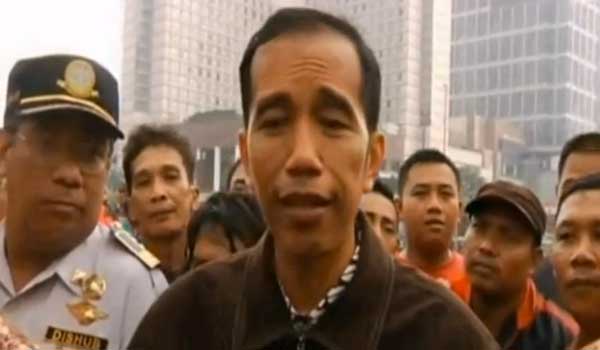Indonesia’s powerful Corruption Eradication Commission (KPK) has clashed with President Joko Widodo, over his decision to nominate a police general with a suspiciously large bank account for the forces top job.
The former Governor of Jakarta, commonly known as Jokowi, rose to power with a clean anti-corruption image and is Indonesia first democratic leader to come from outside of the political elite.
However, less than three months in to his presidency, Jokowi has irked many anti-corruption activists and those in civil society by selecting Budi Gunawan to become the next National Police Chief.
Budi first came into the spotlight in 2010 when a report from the Financial Transaction Reports and Analysis Centre followed by an investigation from Tempo magazine revealed several senior police with suspicious bank accounts.
Budi’s wealth grew from Rp 4.6 billion (AUD $443,000) to Rp 22.6 billion ($2,181,000) between 2008 and 2013, during which time he held several high ranking police posts.
He is seen as a close ally of the former president Megawati Sukarnoputri, who is the head of Jokowi’s political party.
Condemnation of Jokowi was swift from some quarters following the announcement of Budi’s nomination. On Twitter #shameonyouJokowi took off, while activists began an online campaign to pressure the president to back down.
Well-known musicians who staged a large concert to support Jokowi in the final days of his election campaign threatened to take to the streets in protest.
However it was the KPK who dealt the blow, last Tuesday announcing that Budi was a graft-suspect after six months of internal investigations into his history.
The KPK have the power to carry out their own investigations and arrests but still somewhat rely on the co-operation of the police who provide them with investigators.

In the past the KPK have netted many high-profile political and judicial corruption cases, but despite being perceived as one of the most corrupt institutions in the country (according to Transparency International’s Corruption Perception Index) the police have largely remained untouched.
To date every person named as a suspect by the KPK has later been found guilty in court.
Jokowi was previously aware of the commission’s concerns surrounding Budi, as he was one of the names the KPK rejected after Jokowi asked them to vet potential cabinet ministers last year.
The timing of the move from the KPK was highly embarrassing for Jokowi and intended to make it politically untenable for him to push ahead with Budi’s nomination. It worked – by Friday Jokowi bowed to pressure and ‘delayed’ Budi’s appointment pending the completion of the investigation.
Still struggling to string together a coalition with a working majority in the lower house of parliament, the police chief debacle has shown Jokowi remains unwilling or politically unable to come out from Megawati’s shadow.
While the saga is far from over, Jokowi has already done damage to his public reputation as an uncompromising anti-corruption fighter.
* Jarni Blakkarly is a Melbourne-based journalist. He has written for Al Jazeera English, Malaysiakini, The Diplomat, ABC Religion and Ethics and Crikey among others. He is the Politics and Arts Editor at Asian-Australian magazine Peril and is currently in Indonesia interning at Agence France Presse. You can follow him on Twitter @jarniblakkarly
Donate To New Matilda
New Matilda is a small, independent media outlet. We survive through reader contributions, and never losing a lawsuit. If you got something from this article, giving something back helps us to continue speaking truth to power. Every little bit counts.



